#the bible fanfictions
Text
Ah yes, my favourite Bible fanfics, in no particular order
"Paradise Lost", John Milton
"Divine Comedy", Dante Alighieri
"Good Omens", Terry Pratchett and Neil Gaiman
#fanfiction#fanfic#fanfic recommendation#Bible#go#good omens#neil gaiman#terry pratchett#divine comedy#dante alighieri#paradise lost#john milton
4K notes
·
View notes
Note
okay but like. I just had the weirdest thought about that ‘don’t look I’m naked’ comic. Which is that that’s essentially the same thing Adam and Eve did after they ate the fruit of knowledge of good&evil. So I feel like the theological implications of that could kneecap Gabe if he doesn’t think V1 is a being with free will.
yeah ok. i dunno man. is this anything
((side note. this isn’t necessarily meant to be in-character or story-accurate or take place at any particular point in time, just a way to explore some Thoughts. i was also imagining more that V1’s words aren't actually spoken, more like Gabriel’s more articulate interpretation of whatever garbled mechanical noise V1 is using to communicate. I think an angel could do that.))
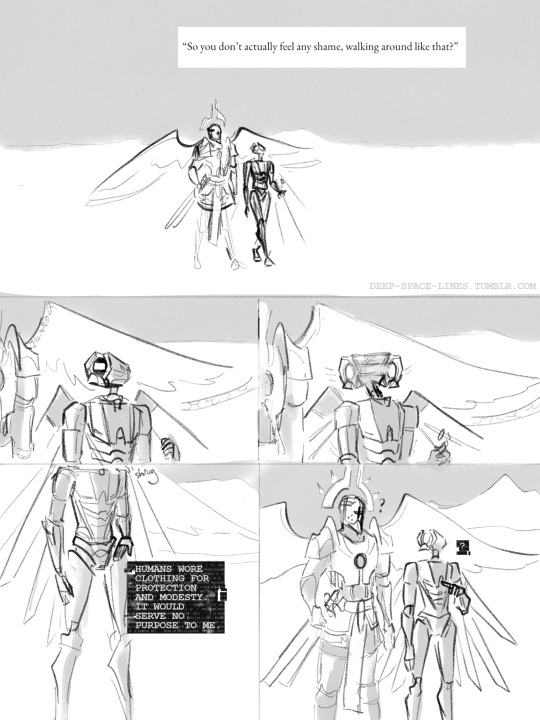

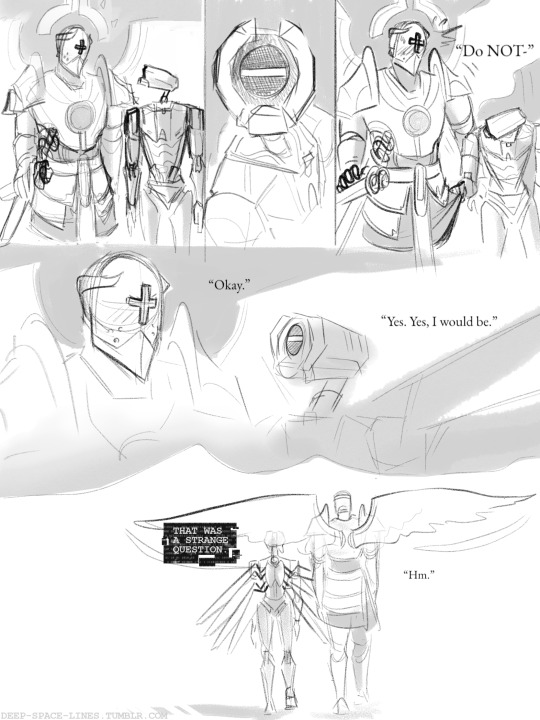
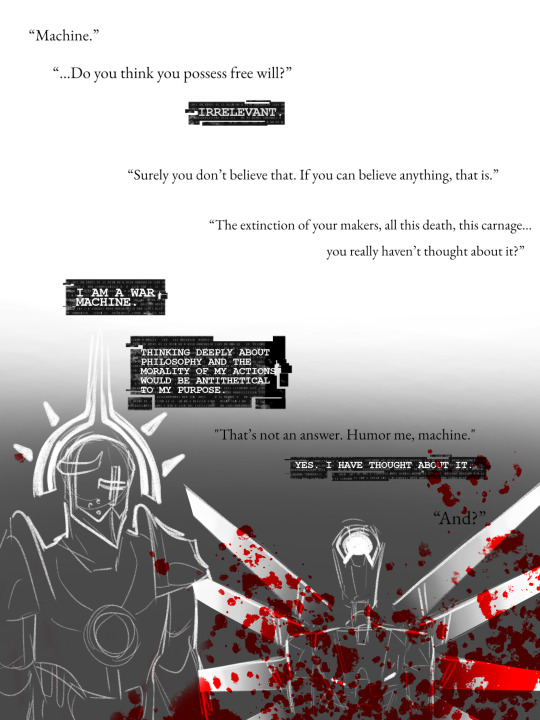
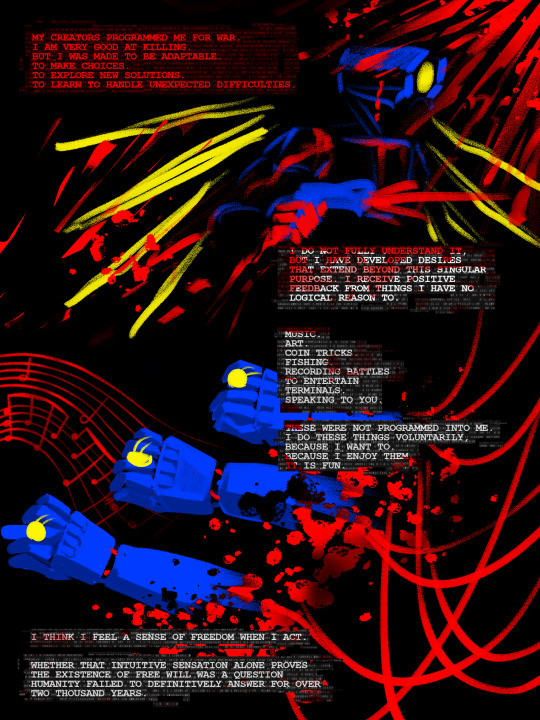
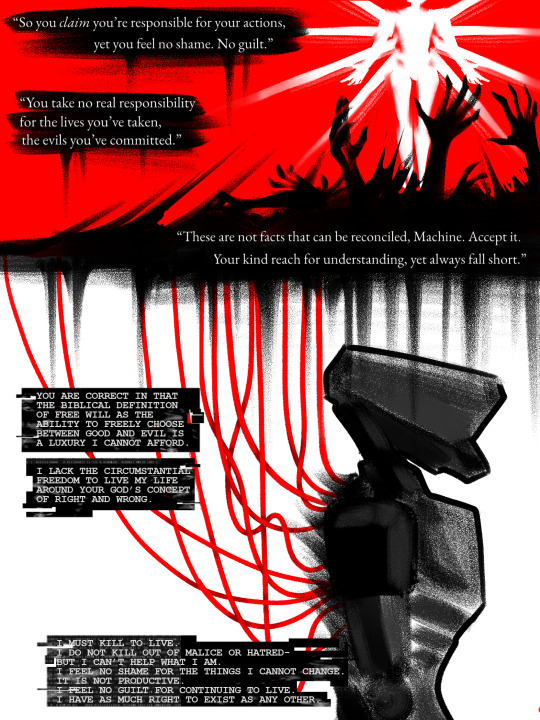
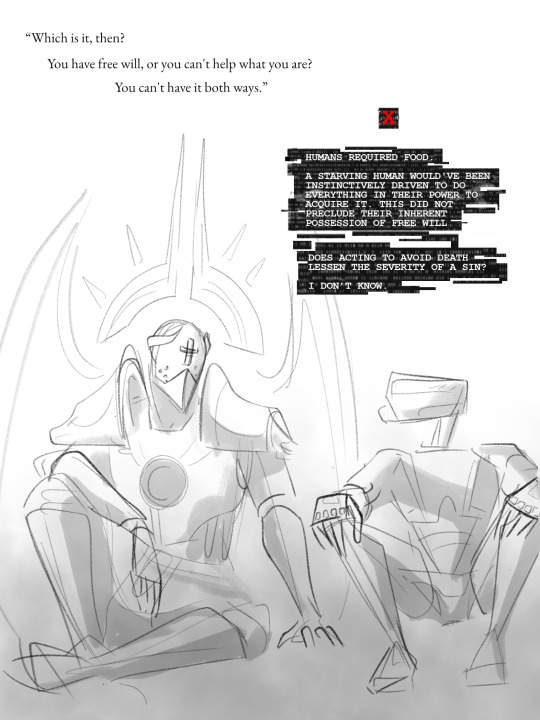
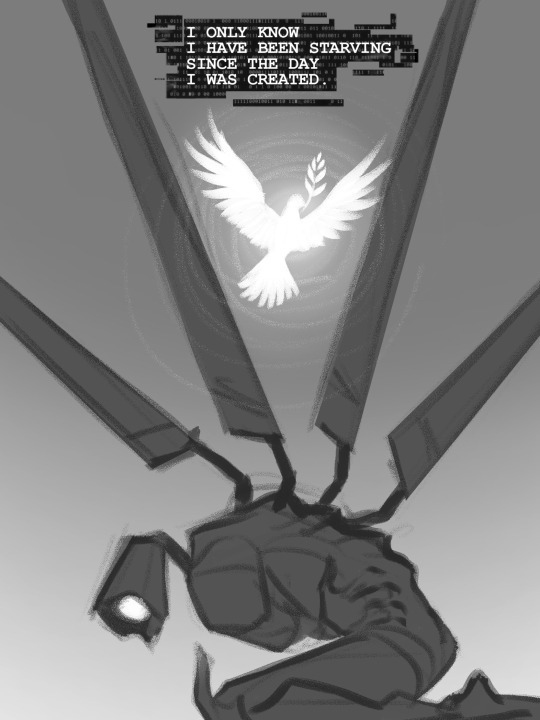

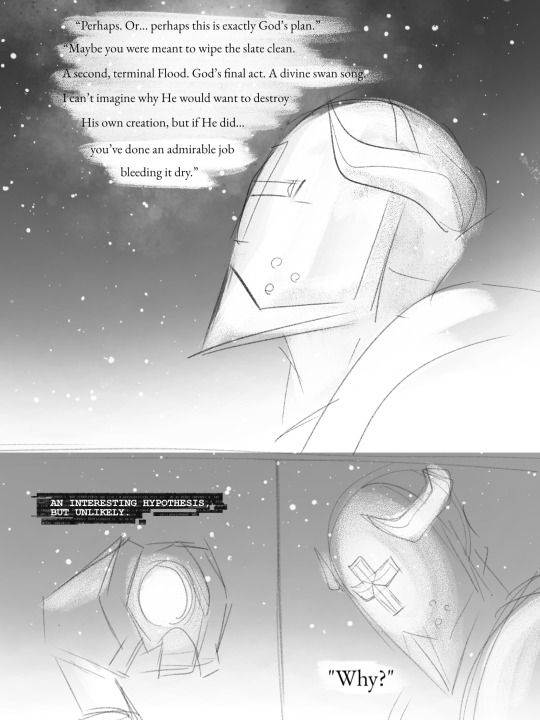

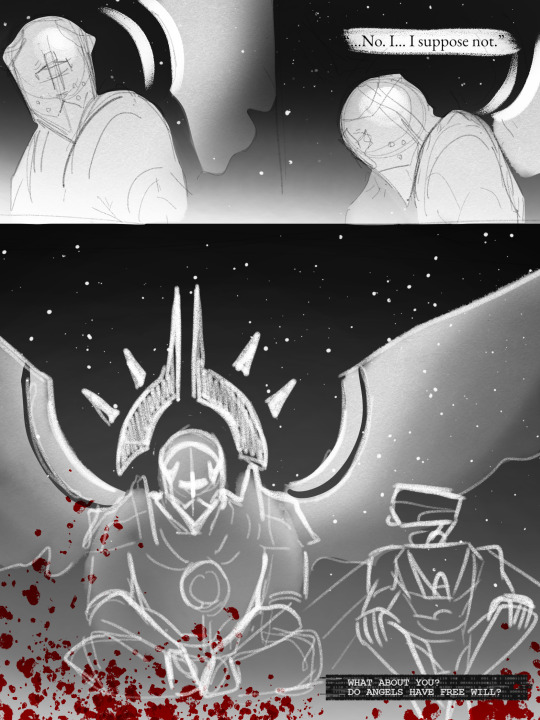
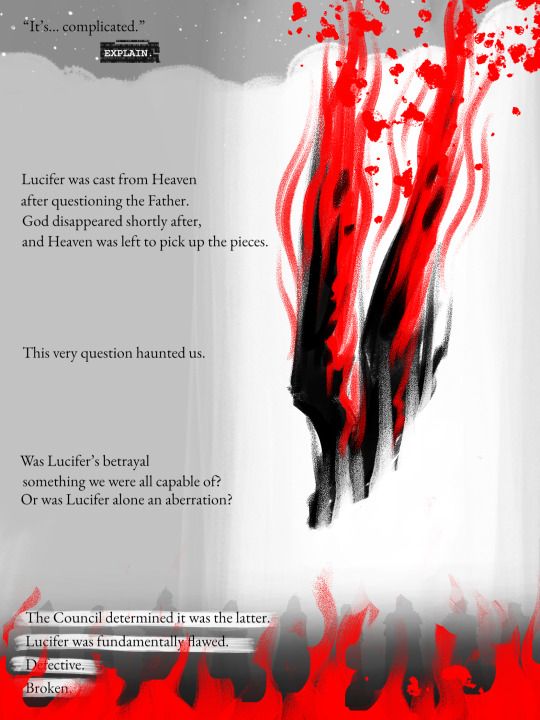
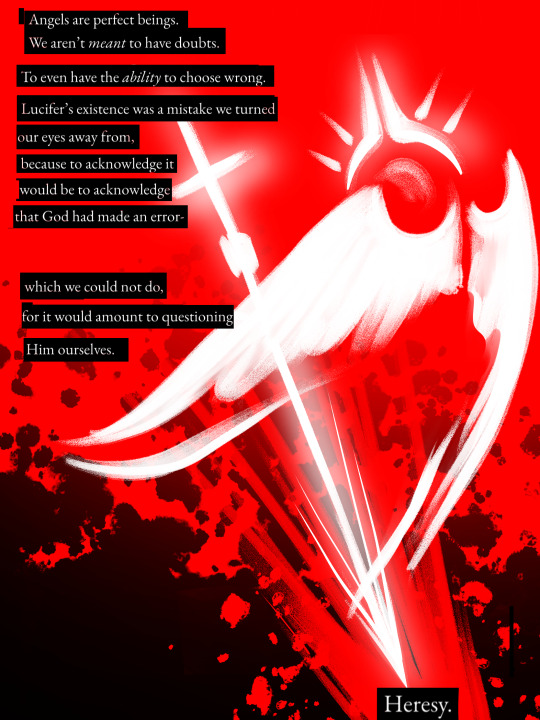
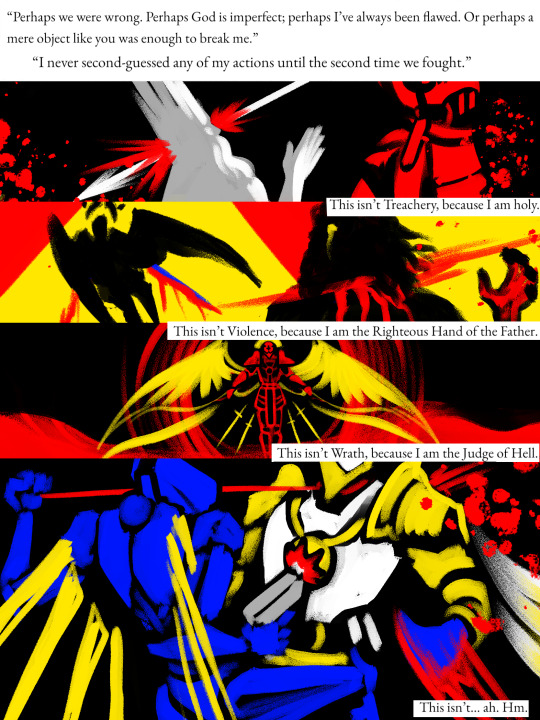
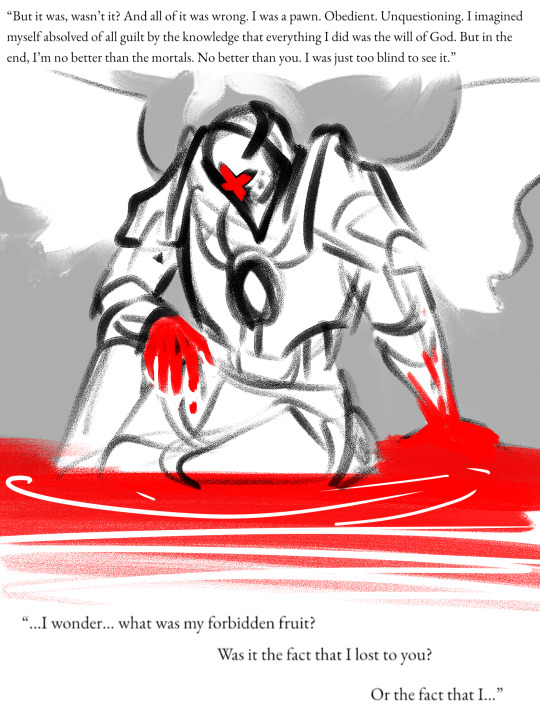
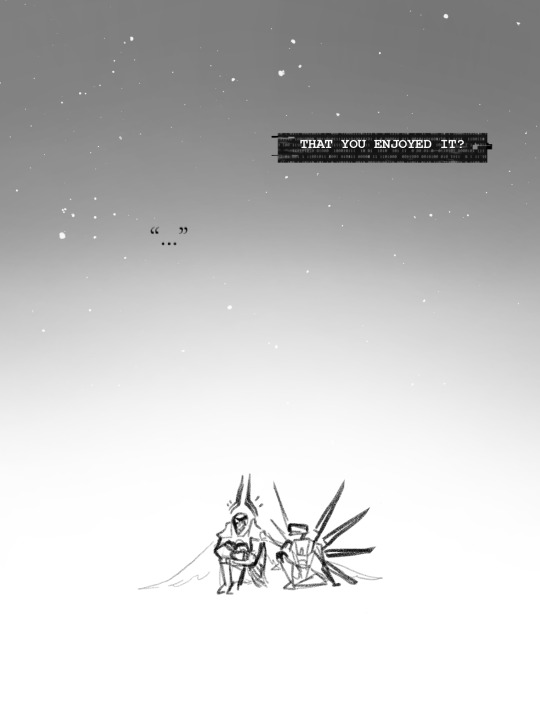
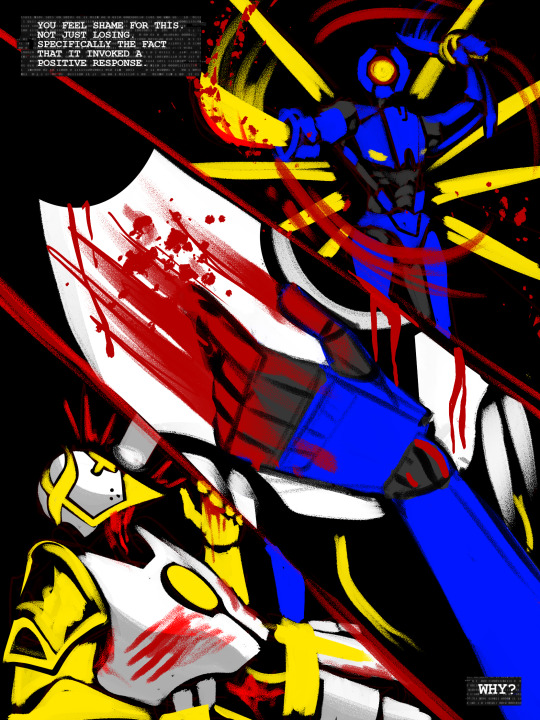

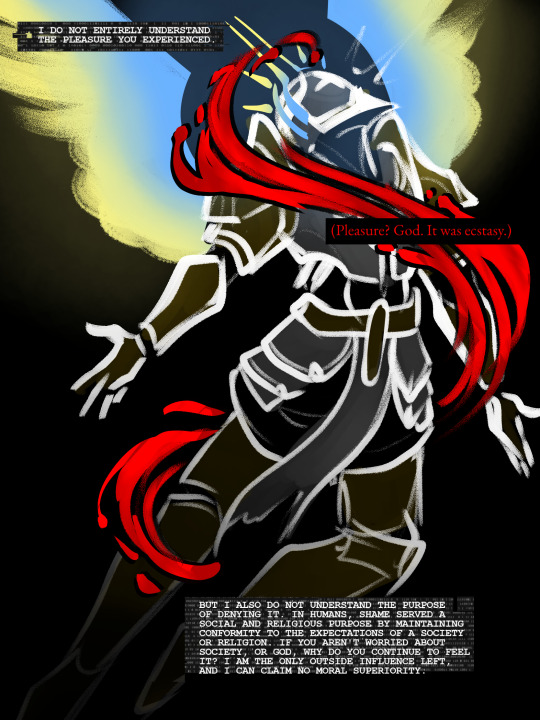
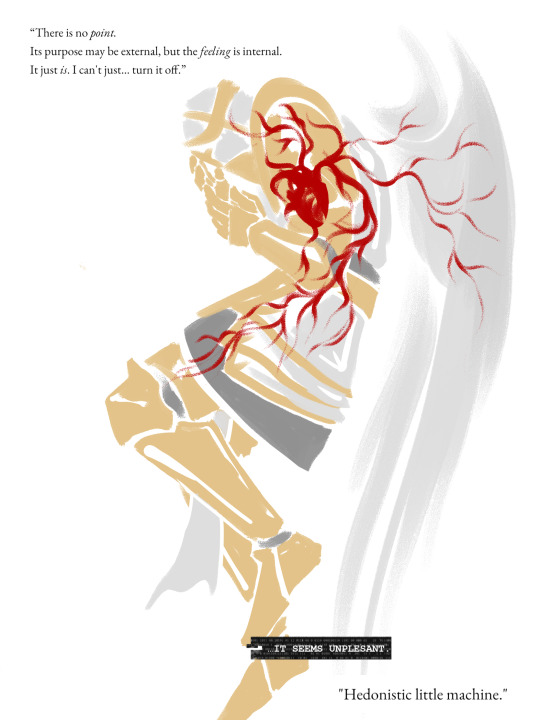

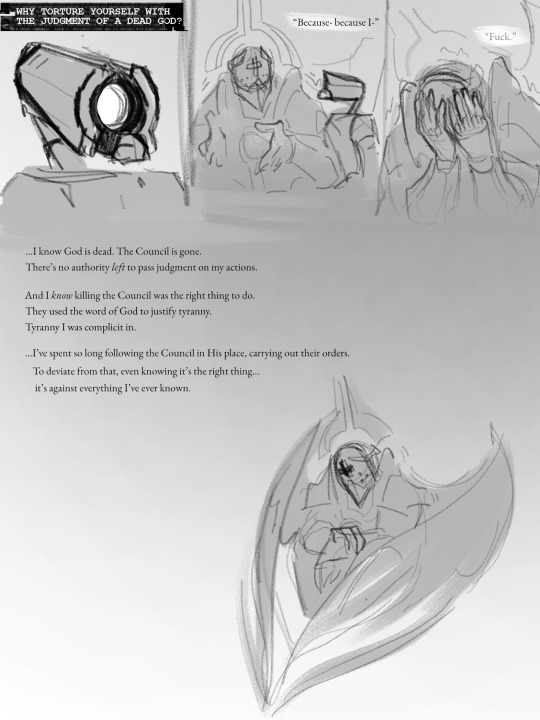


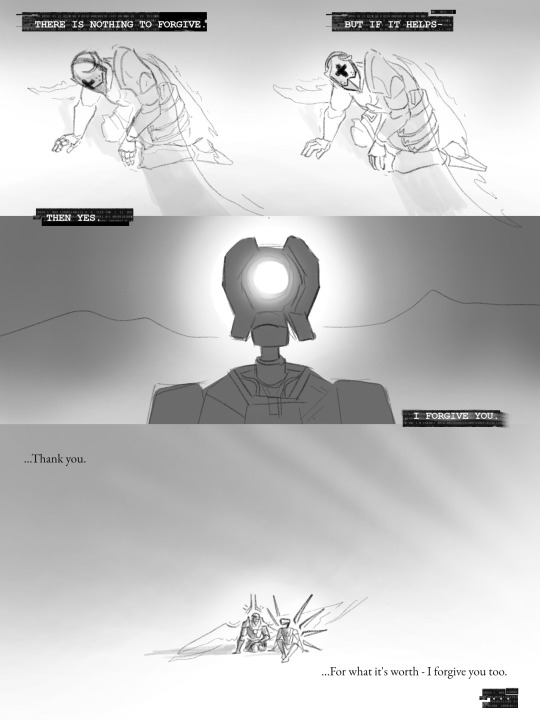

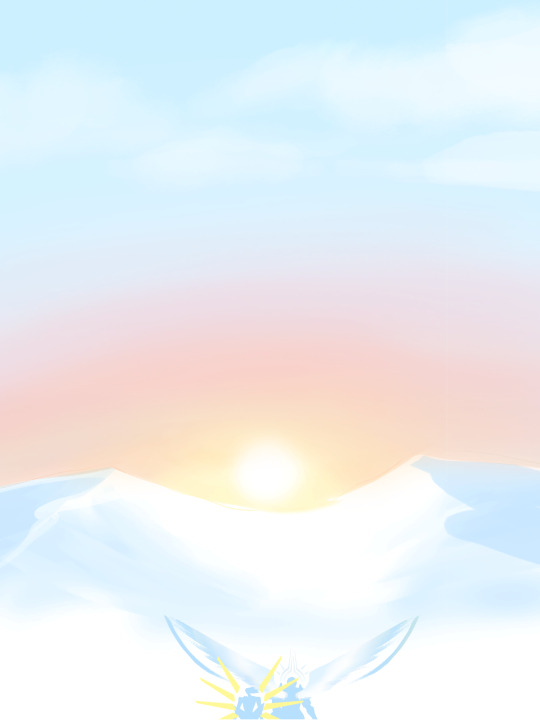
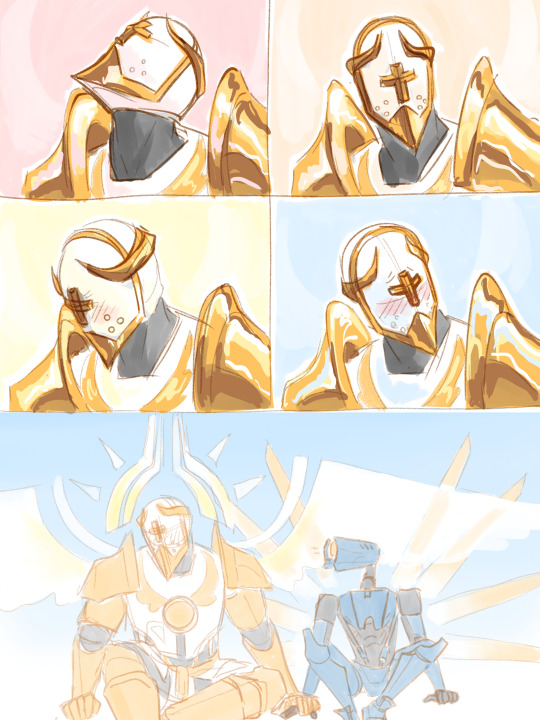

and then they fucked nasty the end
#my art#my writing#who fuckin sent this. fuck you. come off anon so i can kick your ass. (the thoughts this ask sparked consumed almost 3 days of my life)#i dont know what this even is#i just work here#disclaimer i don't come from a particularly religious background so like.#most of my knowledge of christianity comes from when my mom sent me to vbs for cheap babysitting in middle school or absorbed via osmosis#so i have no idea what im talking about except for when i do! hope this helps#i love how i say that like i expect biblical scholars to tear apart my ultrakill gay fanfiction#if you are a biblical scholar and you want to tear apart my ultrakill gay fanfiction please know i am not going to read the bible for this#ultrakill#v1 ultrakill#gabriel ultrakill#gabv1el#blood#love tagging ultrakill stuff with blood. hmm yes the floor here is made out of floor
1K notes
·
View notes
Text
#personally for me#jesus christ superstar#bible#bible fandom#bible fanfiction#supernatural#good omens#the good place#lucifer tv#the divine comedy#dantes inferno#helluva boss#hazbin hotel#jesus christ#lucifer morningstar#paradise lost#destiel#jesus x judas#poll#im not actually catholic anymore#i just have autism#ineffable husbands
468 notes
·
View notes
Text

399 notes
·
View notes
Text
If I got a nickel for every time time I was hyperfixated on a Bible based show (even tho I do not believe in *gestures vaguely* all that) I’d have 4 nickels which isn’t a lot but it’s weird that’s it’s happened 4 times.
#saph says#good omens#supernatural#destiel#hazbin hotel#michael sheen#david tennant#aziraphale#helluva boss#they’re all just Bible fanfiction really#jensen ackles#jared padalecki#misha collins#misha fucking collins#brandon rogers#amir talai#keith david#blake roman#spn
77 notes
·
View notes
Text
The biggest Easter egg yet
I’ve been meaning to address this for a while now, but @camdenleisurepirates gave me the final push after reading my piece on Gabriel’s cross. Huge thanks for that morsel of motivation, my ADHD brain loves you.
This is going to be yet another long read, although not as extensive as my bookshop statues meta. Still, better get yourself some hot chocolate or another drink of your choice and make sure you’re comfortable!
Now, remember the X-Ray interview with Peter Anderson on Easter Eggs in the opening animation he created for the second season? Forget red herrings, apparently our fandom has a literal red phone box! I’m convinced that this whole scene is a one big — the biggest, actually — Easter Egg, and I’ll explain why step-by-step.
The red phone box Crowley used to warn Aziraphale about the Antichrist and the following Armageddon in S1, the exact one where he left change for an emergency call, seems important enough in terms of the future S3 plot, but there’s so much more going on in this frame. Not only the lift.
The angels
At the very start of this sequence we can see a fragment of an elaborate bridge guarded by cherubs sitting on two columns, maybe globes, leading to a distant structure built over a literal mountain of trash — all elements of the S1 and S2 openings which were consciously picked out by the animators and put together in a very ominous pile.
Ready for some scavenging?
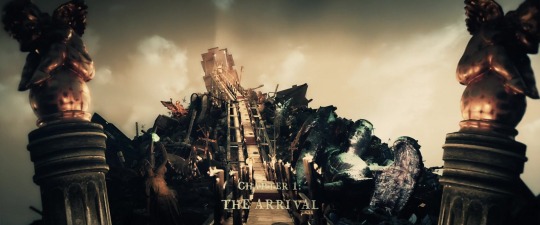

In the Gabriel’s cross meta, I already mentioned the importance of Ponte Sant’Angelo in relation to the ex-Archangel’s statue. Now it’s time to widen our perspective and focus on the full picture — quite literally. Apparently the bridge from the opening sequence has ten statues of angels, exactly as the Italian historical monument.
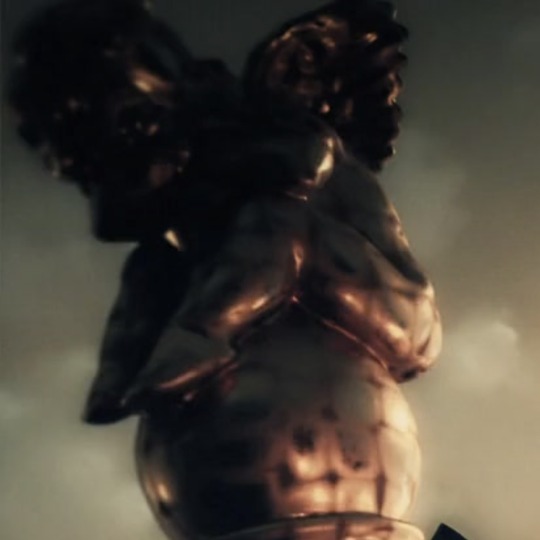
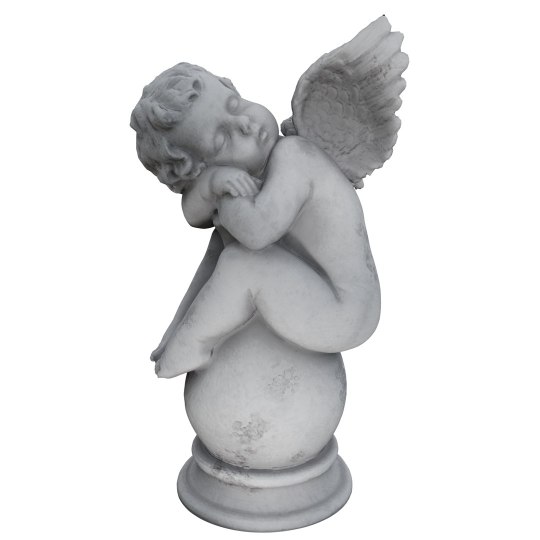
First things first though: the two big cherubs guarding the entry to the bridge might seem familiar to some of you. While they’re obviously not copies of the same statue, a very similar pair of brass cherubs is placed in Aziraphale’s bookshop to symbolize Aziraphale and Crowley. And looking at the screenshot above and the way they sleep or sulk with their backs turned on each other, they are most certainly not talking. The addition of more than one set of eyes is a lovely reference to biblically accurate angel memes though.
If we assume the traditional left-right positioning of the characters, Aziraphale is on the left and Crowley is on the right. Directly behind Aziraphale we can see a ship named “Good Traits”, but in reverse — kinda sorta confirmed by the animator Peter Anderson to be connected to the concept of the seven deadly sins on Twitter. Same that was mentioned recently by Neil in one of his asks.
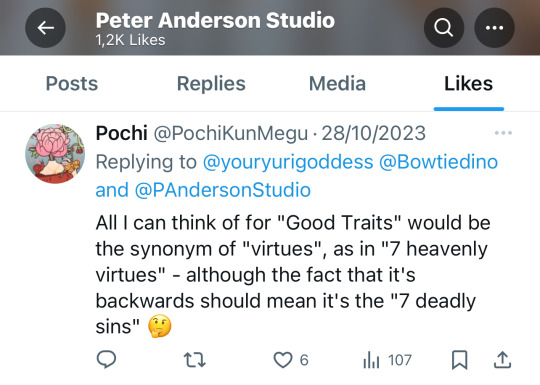
The presence of Gabriel — a renegade Archangel wielding a broken cross — on the right, Crowley’s side, seems to match this theory. It could also support one of the possible interpretations of the very last bookshop shot in the S2 finale.
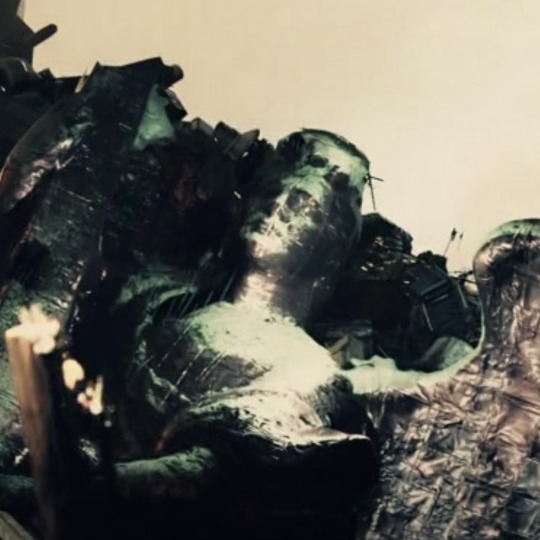
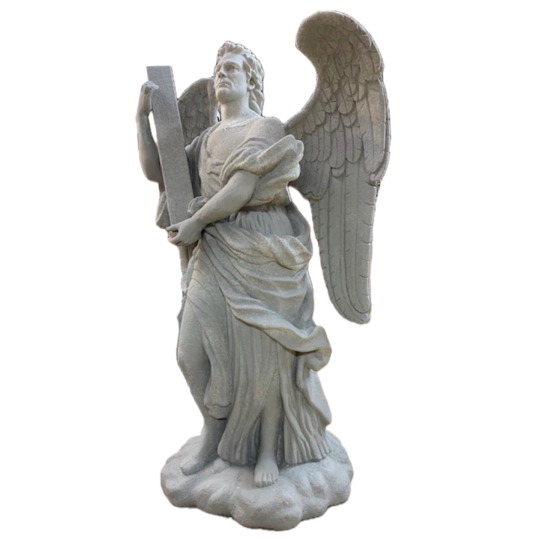
Out of all ten statues, Angel Carrying the Cross by Ercole Ferrata is considered inferior to the others on the bridge in that it appears to be a two-dimensional relief sculpture rather than an unbounded three-dimensional artwork, which seems to match Gabriel’s first impression as a character.
The inscription on the statue reads, “Dominion rests on his shoulders" — that is the weight of the cross that Christ was forced to carry through Jerusalem before being crucified. Even though Gabriel’s burden partially disappeared, the whole bridge and its environment is covered with crosses. It’s clear that we’re looking at a direct parallel of Via Crucis, the Way of Sorrows.
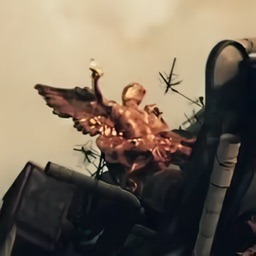
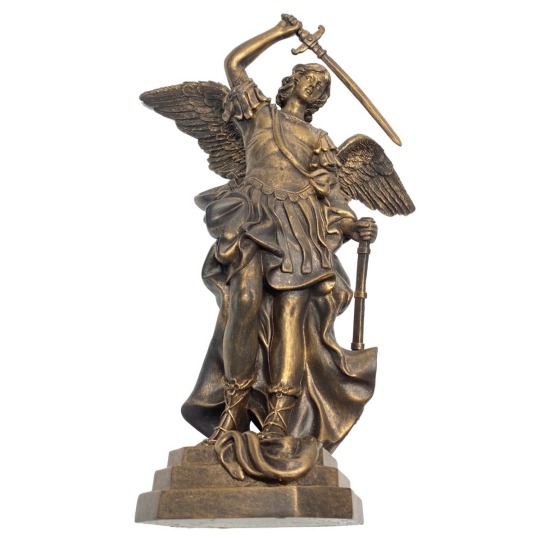
Towering over the Italian bridge, at the very top of Castel Sant’Angelo, is a statue of Archangel Michael, seen as the golden angel on the top left part of the trash pile. Aziraphale’s side, perhaps as his assistant, perhaps a rival? Legends of the Jews mention Michael as the chief of a band of angels who questioned God's decision to create man on Earth. The entire band of angels, except for Michael, was condemned to Fall — which could explain why they have such a good access to the Grapevine That Obviously Doesn’t Exist. And whatever’s going on between Michael and Dagon, perhaps.
In Roman Catholic teachings, Michael has four main roles or offices. Their first role is the leader of the Army of God and the leader of Heaven's forces in the final triumph over the powers of Hell. Viewed as the angelic model for the virtues of the spiritual warrior, their conflict with evil taken as the battle within. The second and third roles of Michael deal with death. Their second role is that of an angel of death, carrying the souls of Christians to Heaven. Michael descends at the hour of death and gives each soul the chance to redeem itself before passing; thus throwing the devil and his minions into consternation. In their third role, Michael weights souls on perfectly balanced scales they are often depicted with as their attribute. In their fourth role, Michael appears as the guardian of the Church. Might be the reason why they’re the closest to the building on top of the mountain.
It looks like Michael lost their sword though, just like Gabriel lost a part of the cross he was supposed to carry. The sword in question was supposed to be used to slay the dragon — Satan, the Adversary — according to John of Patmos and his Book of Revelations.
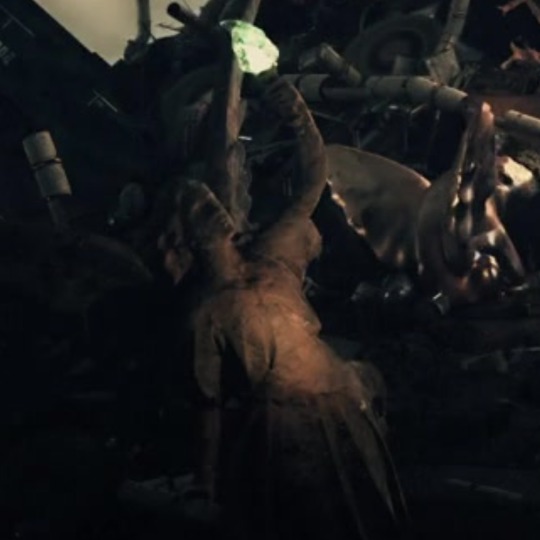
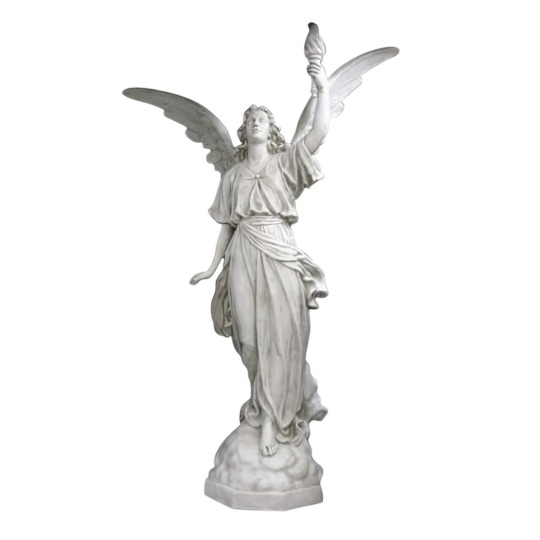
Speak of the devil: interestingly, there are two copies of an anonymous variation of the Angel of Light statue appearing twice on both sides of the bridge. Both the title as well as the statue itself seem like obvious references to one (former) angel literally called the Lightbringer, Lucifer. Perhaps one of them is representing his son, the Antichrist, instead, with the both of them helping out the Ineffables on two opposing — or perhaps only parallel — sides of the bridge?

The light carried by Lucifer appears to be green, a color used in the series as a visual representation of Hell, but on the intertextual level might also serve as a reference to F. Scott Fitzgerald’s classic novel The Great Gatsby and the green light at the end of the Daisy’s dock symbolizing the undying love, desperation, and longing for an unattainable dream. In the story, the color represents the limitations of power and money. Not surprisingly, the novel appears on Jim’s bookshelf and is part of the Good Omens book club — a list of personal recommendations from Neil Gaiman and Douglas Mackinnon for the fans to catch up on before the next series.
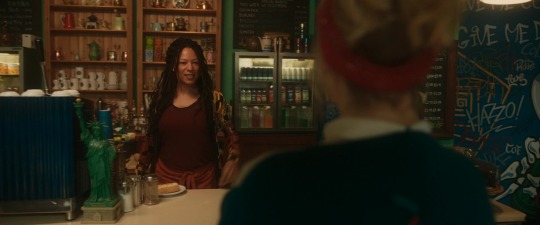
Last but not least, the possible connection to Libertas as the inspiration for the Statue of Liberty, shown multiple times in S2 as a foreshadowing of our character’s trip to America in S3. The related quote of Patrick Henry “Give me liberty or give me death” becomes even more relevant if we consider how the motto of the French Revolution was sometimes written as Liberté, égalité, fraternité ou la mort (“Liberty, equality, fraternity or death”). A lesson surely learnt by a certain angel back in 1793, when he was held prisoner for the last time before being forcefully taken Upstairs in the Final Fifteen.
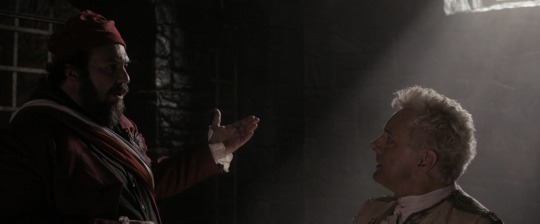
The bridge and the castle
Okay, these are the basic observations. Now a brief historical overview and we will reach the fun bit in a jiffy.
Have you ever wondered about the meaning of this whole complex? It wasn’t always angelic, but named after a Roman noble dynasty. The Aelian bridge was built by the Emperor Hadrian in 134 AD to span River Tiber from the city center to his mausoleum. With time, the remains of more emperors were put to rest in there, until it was plundered and destroyed in a war. Then the remaining structure was transformed into a military fortress and a castle serving as the papal residence in times of war.
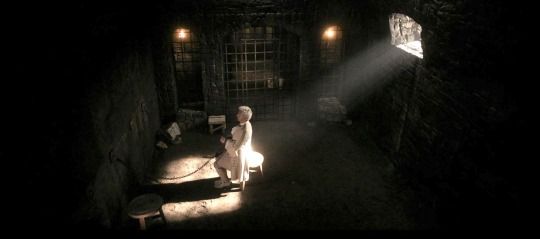
The Papal State also used Sant'Angelo as a prison; the Renaissance philosopher Giordano Bruno was imprisoned there for six years. Executions of the inmates were performed in the small inner courtyard, but they weren’t the only deaths in the area. On the other side of the bridge, in the adjoining Piazza del Ponte, under the watchful eyes of the stone likenesses of two saints, the public executions were held, and the heads of the criminals were brought onto the bridge and exposed to public view there.
As a prison, the former mausoleum is also the setting for the third act of Giacomo Puccini's 1900 opera Tosca. Long story short, the eponymous heroine convinces her lover to feign death so that they can flee together. Unfortunately, they are betrayed and the firing squad shoots at him with real bullets instead of blanks. Tosca believes in the quality of his acting performance rather than the truth, and when the realization hits her, she leaps to her death from the Castel’s ramparts.
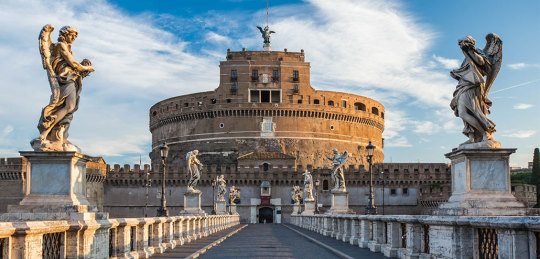
After Nero’s bridge was destroyed, the travelers were forced to cross this bridge as the only direct route to the Vatican and St Peter’s Basilica, earning it the nickname “the bridge of Saint Peter”. That’s why in the 16th century Pope Clement VII erected statues of Saints Peter and Paul at the ends of the bridge, guarding it as they are supposed to protect the entry to Heaven.
In 1688 the bridge was embellished with ten angel statues, five on each side of the bridge, carrying Arma Christi, the Instruments of the Passion. The Good Omens characters represented by those statues in the opening sequence might be other instruments of Christ’s suffering as parts of the system that needs to be overthrown or replaced.
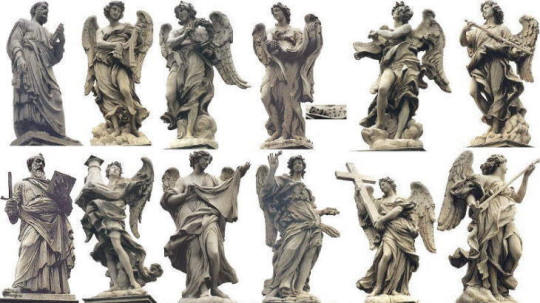
One angel appears particularly important in the context of both the bridge and the Second Coming — Saint Michael the Archangel.
Legend holds that the Archangel Michael appeared atop Hadrian’s mausoleum, sheathing their sword as a sign of the end of the plague of 590, thus lending the castle its present name. A less charitable yet more apt elaboration of the legend, given the militant disposition of this particular Archangel, was heard by the 15th-century traveler who saw an angel statue on the castle roof. He recounts that during a prolonged season of the plague, Pope Gregory I heard that the populace, even Christians, had begun revering a pagan idol at the church of Santa Agata in Suburra. A vision urged the Pope to lead a procession to the church. Upon arriving, the idol miraculously fell apart with a clap of thunder. Returning to St Peter's by the Aelian Bridge, the Pope had another vision of an angel atop the castle, wiping the blood from his sword on his mantle, and then sheathing it. While the Pope interpreted this as a sign that God was appeased, this did not prevent Gregory from destroying more sites of pagan worship in Rome. In honor of the vision and Michael, the bridge was renamed in their name.
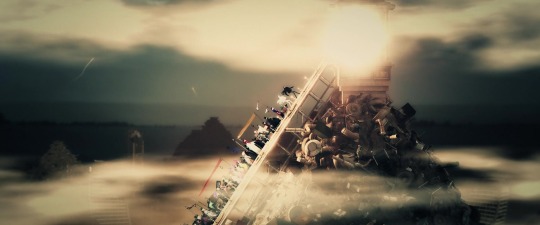
What if the procession from the opening sequence was meant to imitate the procession led by the Pope from the legend? What if Aziraphale, now officially a Supreme Archangel, Commander of the Heavenly Host, is the one actually leading it, with Crowley finally at his side as his partner and second in command, just like it was proposed by him in the Final Fifteen?*
What if by some reason, maybe personal ambition, maybe just a tragic coincidence or situational necessity, there really was an impostor in Heaven, and Metatron — the so called Voice of God who seemingly doesn’t speak up for Herself since Job’s test — has been playing a winged version of the Wizard of Oz all along?
It would make just the perfect sense if not for one tiny detail. The procession we see on the bridge is actually led by Crowley, which doesn’t fit the parallel at all — unless it’s actually a proof of an ongoing body swap, as the mismatched names of the actors could also suggest?
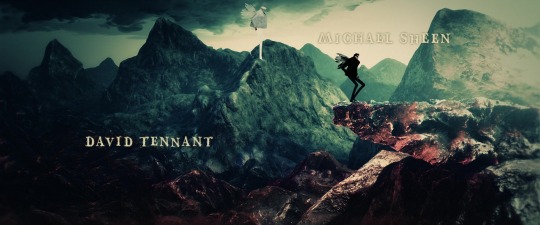
The mountain of trash and the bookshop
The symbolic mountain of trash we can see Aziraphale and Crowley climb is a reference in itself. To an actual mount called Zion, believed to be the place where Yahweh, the God of Israel, dwells (Isaiah 8:18; Psalm 74:2), the place where God is king (Isaiah 24:23) and where God has installed king David on his throne (Psalm 2:6).
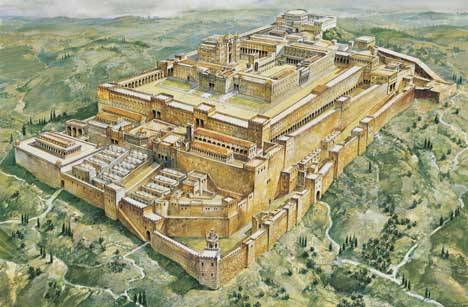
In a literal sense, it’s a hill in Jerusalem, although the sources refer to three different locations in different contexts — although for the purpose of this meta the Upper Eastern Hill (Temple Mount) makes the most sense. Its highest part became the site of Solomon's Temple. The same King Solomon the rituals in Freemasonry refer to. Masonic buildings, where lodges and their members meet, are sometimes called "temples" specifically as an allegoric reference to King Solomon's Temple, not actual places of worship. And Aziraphale’s bookshop is built around Solomon’s Magic Circle.
In a metaphysical sense, and especially in the context of the Christian New Testament, it is also believed to be a part of Heaven — the heavenly Jerusalem, God's Holy, eternal city. Christians are said to have “(…) come to Mount Zion and to the city of the living God, the heavenly Jerusalem, to an innumerable company of angels, to the general assembly and church of the firstborn who are registered in heaven” (Hebrews 12:22-23 cf. Revelation 14:1). Just like the procession were following in the opening sequence.
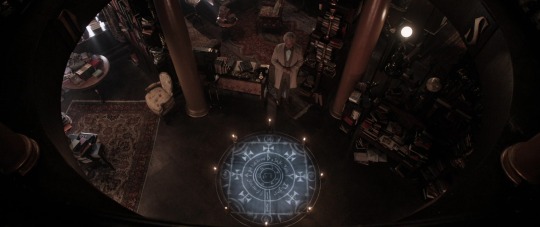
There’s been some speculation whether the lift on top of the mountain could symbolize Aziraphale’s bookshop, or, more specifically, the oculus in its centre. If you look closely at the enhanced screenshot, you can see that the dome isn’t made of glass and that it looks like a tower (a church’s bell tower, perhaps) more than a whole building.
And there is an actual doorway in there — not like the modern lift doors — opening up towards the source of that white, heavenly light. And what kind of enlightenment can you usually find up in the skies or heavens?

We’re welcomed to crack open the doors to the Heavenly Sanctuary — the Most Holy place, Sanctum Sanctorum, the Holy of Holies — to undraw the final curtain and finally stand eye to eye with God. Who knows, maybe even ask some questions or listen to some answers.
Or, at the very least, to meet one of Her forms known as Jesus Christ. Because that’s precisely where he serves as our (humanity’s) Mediator and the Holy Priest after his Ascension to Heaven. The structure at the top reminds of some temple architecture seen in Antiquity and Christianity.
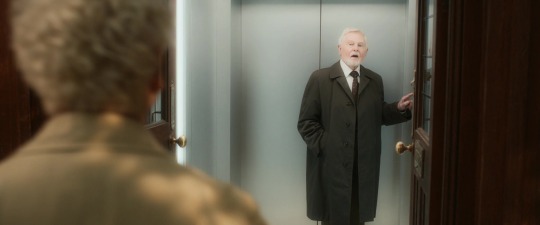
The Catholic Church considers the Church tabernacle or its location (traditionally at the rear of the sanctuary) as the symbolic equivalent of the Holy of Holies, due to the storage of consecrated hosts in that vessel and their meaning as the Body of Christ. Tabernacle is commonly marked with a red light turned on and off depending on His presence or lack if it.
Looks like He’s already in the area, one way or another, keeping eye on some things.
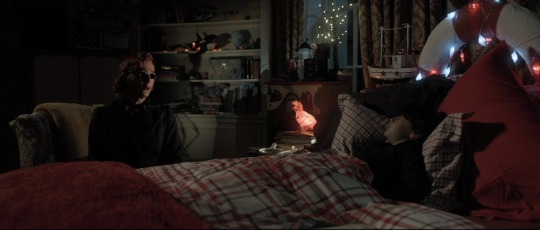
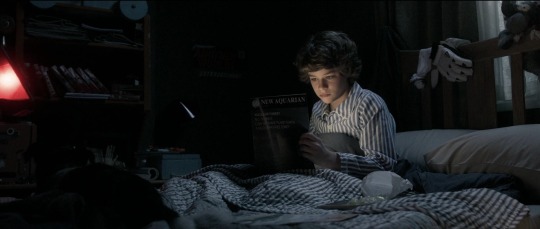
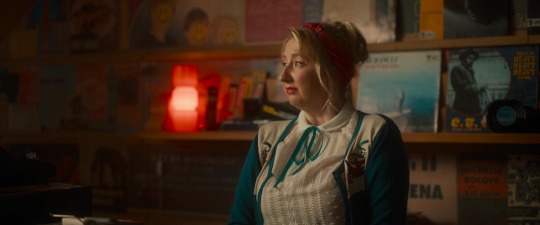
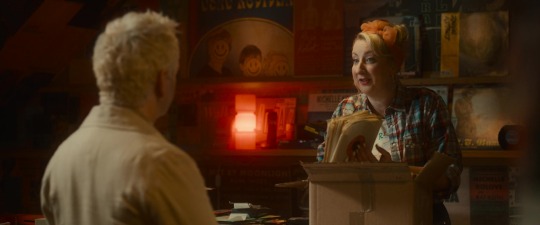
Are we following a procession of believers happy to embrace their one and true Savior? Or are they actually protesters on their way to dethrone the authority and the system?
Guess we will have to wait and see.
#the good omens crew is unhinged#everything has a meaning#title sequence#angels everywhere#archangel fucking gabriel#gabriel’s statue#bookshop statues#statues update#ponte sant’angelo#let there be light#good omens analysis#good omens meta#bible fanfiction#yuri is doing her thing
144 notes
·
View notes
Text
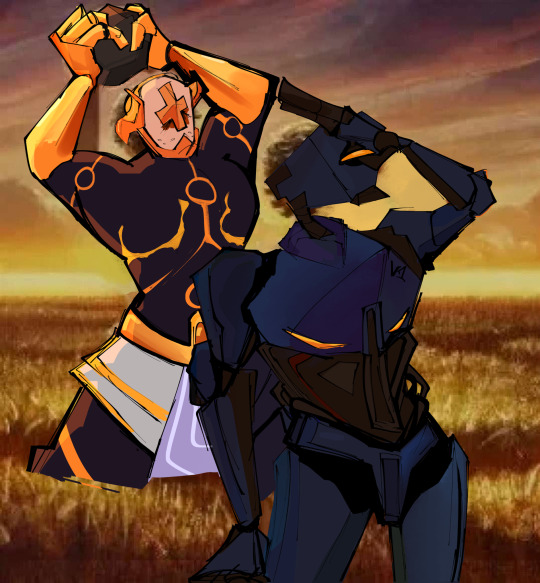
NOTHING IS FUN ANYMORE!!!!
Throwing rocks at the machine:

#digital art#art#ultrakill#ultrakill fanart#ultrakill game#ultrakill gabriel#gabriel ultrakill#ultrakill v1#v1 ultrakill#ultrakill sex update#gabriel judge of hell#bible fanfiction
622 notes
·
View notes
Text
“What did you do?” Adam asked.
Cain—his first born, the first ever born—looked at him with eyes wide and terrified. Adam’s eyes, Eve would say, the same brown of rich, rain-watered soil.
“I don’t know,” Cain said. “I don’t- Dad, I don’t know. Why won’t he wake up?”
Cain’s lip trembled, hands clasped tightly together, tears welling and falling in great fat drops. He was still so young, younger than Adam had ever been. His knees were knobbly and his wrists thin and he barely came up to Adam’s chin. Big enough to work, to till the fields and pull the weeds and harvest the crops, but small enough to curl tight in his mother’s arms when lightning cracked the sky.
On the ground was Abel, even younger yet. He tended the flocks and kept watch for anything that might want to harm them. He was good with them—gentler than Adam understood, though Eve told him to let him be. Even now several sheep creeped closer, braying nervously at the sharp scent of iron.
Abel was still shorter than Eve. He had a gap in the far back of his mouth where the last of his molars had popped out only a handful of days before. He had freckles that showed up in the summer sun, as if he had grown them there, all over his face and shoulders and arms.
“Dad, what do I do? What can I-?”
Abel’s eyes were open, looking to the sky that they so resembled, but they didn’t see anything. Somehow, Adam knew. Abel wouldn’t see anything ever again.
Adam hadn’t known that they could die. Humans, that was. Adam hadn’t known that Humans could die. How could he?
He’d suspected, of course. He bled when he was cut just like the animals he’d learned to butcher for their fat and meat and skin. He grew weak when they had little food to come by, they all had fallen ill a time or two, he’d watched as Eve lost what would have, otherwise, turned into a child. It wasn’t a shocking conclusion to reach, but he’d never known for certain. Not like he did now.
Adam fell to his knees, hands helplessly cradling Abel’s face. His son, his body, his baby-
There was so much blood, comign from the cracked-open place in Abel’s brown hair. It dyed his curls slick black, spilling down his neck. The soil was covered in it. This place would be stained for days—weeks, maybe even months—just as the place they slaughtered the livestock was marked as a place of death.
“I’m sorry. I don’t know what to do. I’m sorry.” Cain was sobbing, hiccuping over his words and gasping for breath.
Adam’s vision was blurring as his own tears came. Abel’s face felt rubbery and wrong underneath his hands. Lifeless.
This was wrong. This shouldn’t have happened. This should never happen. Abel was so young, had so much more to live. He would keep growing—maybe until he was taller than not only his mother but Adam too—and he would continue to tend the flocks like personally tending to the lambs that fell ill with sudden weakness and some day he would have his own children because that’s how it worked, how God had told them it worked and He never lied.
“D-Dad, say something, please. Daddy, say something!”
Cain was his son, too. The first Human ever born when Adam and Eve still struggled to provide even the most basic needs for themselves. He was a good boy—always so helpful, always so smart. He knew when food ran low, when the well pulled up dry, when the hearth burnt out, that it wasn’t easily fixed and so he didn’t complain and tried his hardest to make it better, somehow. He was a good son.
So why had he done this?
“What happened?” Adam asked, still looking at those glassy blue eyes.
“I-” Cain stuttered, like he didn’t expect to be asked. “We went to bring out sacrifices to God. I brought what extra I had grown and Abel slaughtered a goat—the little one, with the limp. God accepted the goat but He…He said I was to do better.”
God was like that sometimes, Adam knew. He didn’t know why, maybe He just liked meat better than grains and fruit.
Each time they had to butcher even a chicken Abel got—had gotten—upset. When they slaughtered the goats and sheep and cattle he always cried, but they needed to eat and God needed to be praised and worshiped.
“He- He always says that, but I give Him everything. I’ve always set aside the sweetest fruit, the finest wheat, the very best of the lot. I make sure to give Him everything Mom thinks we can spare—sometimes even more because I don’t want to disappoint Him.”
Cain sounded desperate. Like he needed Adam to understand.
“What happened?” Adam repeated. His voice thundered, and he saw Cain’s feet stumble back. Some part of Adam was distraught at having incited such a fearful reaction, but some other part nearly reveled in it.
“I was just so angry,” Cain said, sounding miserable and defeated and small. “It isn’t fair Abel is always getting praised when he’s choosing the weakest and worst of what he has. I didn’t…I wanted him to hurt but not this badly.”
“Wasn’t,” Adam said.
He was shaking, but not from cold or fear. Rage coursed through him like it never had before—not even when Lilith left him, or when he’d bitten into the Fruit and understand what they had just been tricked into doing, or when God had cast them from Eden.
“What?” Cain asked. He still sounded so small, like he was Seth’s age instead of nearly fifteen. Maybe even younger than that.
“It wasn’t fair. Abel was getting praised.”
“No! No, Dad, he isn’t- I didn’t-”
He understood what he’d done. He probably had since the very start, or close to it. He was never stupid.
“He is,” Adam said, and finally looked at Cain.
Cain looked lost. Frightened, in many ways, like every single thing he knew had been upended and scattered. Adam…couldn’t feel much of anything.
“He can’t be,” Cain said, a plea like a prayer. “I didn’t mean it.”
“He is. He’s dead. You killed him.”
“No,” Cain wept. “No!”
Adam was standing. His hands were covered in his son’s blood, his son who lay dead on the ground at his feet. Cain shrank away from him, like-
Like he was afraid Adam might kill him.
“Leave,” Adam said.
Cain sobbed. “No, Daddy, please- I didn’t know! I didn’t know!”
“Leave!” Adam shouted. “You killed him! Get away from here, get out!”
Cain tripped over his feet, scrapped a knee and both palms in the dirt. And then he ran.
Adam watched until he left the field they had tended together, that Adam had first sowed when Cain was first learning to wobble on chubby legs. He watched as he tore through the brush and sharp brushes, until he lost sight of his hair and brown tunic, until he couldn’t hear him in the forest. He stayed there, staring off into the space where he had gone, until a small lamb brayed near his feet.
The creature had crept closer to him and its fallen favorite master. It bleated at the boy crumpled to the earth, clean white wool coming nearer and nearer to being stained by the blood congealing in Abel’s clothes.
“Fuck,” Adam said. His boy—his boys. Cain and Abel, the first two and then only two for several grueling years. One always coming right after the other.
Hadn’t Eve seen this coming? Had a dream so terrible it woke her in the night with a start so strong it had woken Adam, too? She’d begged him to help them, their two eldest children, to prevent the animosity she knew was brewing.
Adam hadn’t believed her, not really. The boys adored each other, it was plain as day to see. Still, she had insisted and it wasn’t that bad of an idea to separate their area of work. Perhaps it would be best, in the long run, for Cain to know as much as he could about farming the earth and for Abel to know how best to tend to their animals. A downright practicality. Up until this moment, had Eve come to him again with her concerns, he didn't think he would have believed it.
Even now, even after all this…he couldn’t actually believe that the two hated each other. Certainly not their sweet, gentle Abel and their thoughtful, dedicated Cain. Not when the roughest tumble they’d gotten into before had only resulted in bruises because they’d accidentally fallen from the river bank they’d been walking near. Not when Adam had watched Cain rise from the bed he and Abel shared with their youngest brother, delicately extracting himself from the tangle of limbs so as to not wake the others, only this morning.
“Fuck!” Adam yelled, tears falling hot and fast.
It was frighteningly easy to gather Abel into his arms. To carry his limp little body back to the house—back to his bed, his mother, their hearth.
“Adam?” came Eve, as he entered their little yard. “What- no, no!”
She must’ve thought he was carrying something else, at least for a moment, but the instant she realized her scream was shrill enough to send the chickens flying to the trees.
“No, no, my baby, my baby,” she cried, running to Adam as if she could take the weight all unto herself. “No, please, this can’t- oh!”
From where Eve had come was Seth, only seven and still little enough to cling to his mother’s legs when uncertain. He looked very much like he would like to do just that, now, old enough to understand that he wouldn’t be able to. Not when Eve wept as she did, not when Adam’s face was wet, not when Abel was limp and Cain was nowhere to be found.
Eve crumpled to her knees, taking Adam down with her. Her arms crossed beneath his. Between them they cradled Abel, so small and so young and so very dead.
~~~
A/N: Full disclaimer I did in fact write this because I watched Hazbin Hotel. Yes, it did surprise me that such a stupid little show (that I have semi-complicated opinions about but did enjoy watching) inspired something like this. I don't think it's strongly related to Hazbin Hotel in any way, though it could be if I was actually interested in expanding it (and I'm not really). There is non-negligible impact from Supernatural and Good Omens in this as well.
#adam and eve#cain and abel#religious trauma#ex catholic#my fic#my writing#call it an original work if yall want idk#I could put this on ao3 but idk what 'fandom' it would be under#honestly i am leaning original work at this point#tw miscarriage#tw character death#tw religious themes#religious imagery#bible fanfiction#because that's a tag#hazbin hotel#hazbin hotel adam#supernatural#good omens#or any of those other religious trauma packed shows
139 notes
·
View notes
Text
Some Christian Lore I think will be important for GO S3
I don’t think there is gonna be a baby Jesus y’all… theories that Maggie is the new Mary or Aziraphale will show up with a baby on Crowley’s doorstep fail to take into account the actual Christian myth and lore
Jesus rose from the dead and ascended BODILY into Heaven. According to the Gospels and Revelation that same embodied Jesus is returning to Earth.
And Neil is like A SCHOLAR for religion, he knows these stories.
So I’m just throwing out there, while we are all theorizing, that we are probably getting a 33 year old Jesus coming to Earth and having NO IDEA how Earth works since he was last here >2000 years ago. (I could be wrong)
So im thinking more like George of the Jungle film where Brendan Fraser is Jesus and Leslie Mann is Aziraphale; a fish out of water / man outta place comedy
327 notes
·
View notes
Text
I think people are forgetting one of the most consequential kisses in the Bible when analyzing the Good Omens kiss.
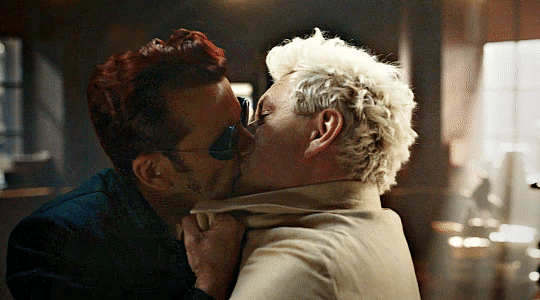
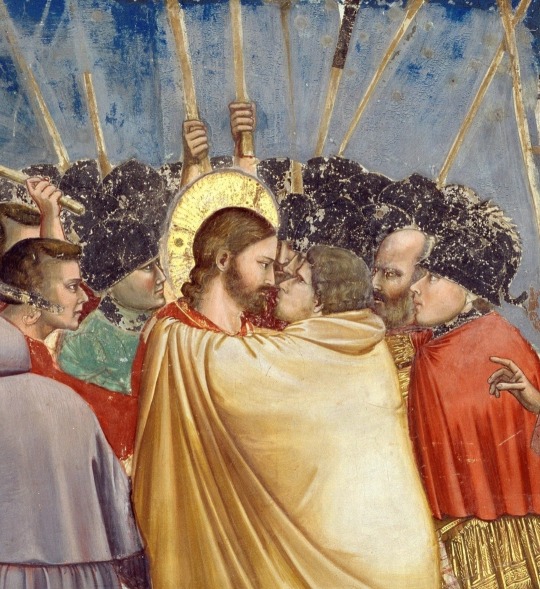
The kiss of Judas.
While I don't think anyone is going to be crucified, I'm just surprised I haven't seen anyone mention this yet. I'm not passionate enough about this to write out a whole analysis, but the roots of "betrayal" are there.
But who has betrayed whom?
Anyway, fingers crossed for a happy ending for these two.
#good omens spoilers#good omens season 2#neil gaiman#good omens#aziraphale#crowley#the kiss of judas#bible fanfiction#rip Jesus#go2#go2 spoilers#go2e6#mp
315 notes
·
View notes
Note
This is for a school project. When was the first fanfiction?
The biblical tale of the Tower of Babel is in fact, fanfiction.
Written in 2989 B.Y.A. (before you asked), the tale of the tower's construction itself is based heavily on earlier writings such as the Tale of Enmerkar and the Lord of Aratta from ancient Babylon. The original included the story of a tower so tall that it angered the gods, but focused mainly on various political conflicts.
The story of the Tower of Babel took the story of the tower and ran with it. Moses, who had already written most of Genesis as a self insert for Ao3 (in those time, Ao3 referred to "Assyria's old orange omphalos," on which many ancient tales were inscribed) decided to repeat the elder tale because he thought it was just pretty darn cool and it explained a lot about why people from Mt. Sinai are like "Shalom" but people from Jabal Maqla are all "Salaam."
166 notes
·
View notes
Text
Starting to think that the key to being a staple “must watch” anime is to trick people into learning philosophy cause we’ve got:
Evangelion - come for the mecha fights stay to learn about the “self”, reality, and identity
Cowboy Bebop - come for the space cowboys stay to learn about what it truly means to live and to be alive
Trigun - come for the silly main character and cool fights stay to learn about pacifism, forgiveness, the sanctity of life, and the strength of hope
Fullmetal Alchemist - come for the cool science “magic” stay to learn about Plato, what is truth, and how to live a good life
#this is the TLDR surface level but you get what I mean#they put something in the water in the 90s that’s all I’m saying#I can’t watch normal shows again like nothing will ever be this good#I watched Trigun because stampede was all over my twitter feed#now I’m obsessed with a Bible fanfiction#I watched cowboy bebop bc it’s one of those staple must watch animes#now I can’t stop trying to figure out what the show is trying to tell me#I also watched evangelion because it’s a staple must watch anime#now I’m watching I wisecrack video on it#wish I never watched these shows they’ve raised my standards and nothing can satisfy me anymore#that is a light hearted comment btw#somebody put something in the water again I want more stories like this#anime#90 anime#cowboy bebop#Trigun#Trigun stampede#Trigun maximum#evangelion#almost forgot about FMA#totally didn’t at it in post shhhh#fullmetal alchemist#fullmetal alchemsit brotherhood#FMA#FMA brotherhood
245 notes
·
View notes
Text
Title: The Fallen and The Falling (aka TF & TF)
Pairing: Adam / Lucifer
Author: Cursed Mod
Rating: PG
Word Count: 714
Summary: (A Drabble Compilation Probably)
This is one of many parts of an ongoing series that I'm writing about Lucifer and Fallen Adam. Other character and ships may appear. Who knows. I sure don't.
Warnings: Features aspects of Folk Catholicism specifically of the Latin American variety. Mild body horror and nonconsensual body modification.
No, this isn't beta'd or edited. Enjoy and ignore the formatting I'm on my phone.
~
Dust settled and the celebrations were in full swing, yet there was a stillness in the air immediately around Lucifer despite all of the faint music and chatter around the hotel and the city as a whole. This was what it was like to be winner, but the taste of victory was bittersweet on his tongue. There was still something he felt needed to do.
Lucifer allowed his feet to take him where they'd left Adam's body with a simple sheet covered him, though a breeze had started blowing that away. This was when Lucifer realized that this need was absolutely morbid, especially when he sat down next to the body. His intention to pull the sheet back over, maybe recite some words or humor heaven with the proper prayers. Something nice, something respectful. Maybe cover the body in a little bit of dirt before some cannibal came around to eat it.
Instead, he found himself marveling at Adam's face. The man looked as he always had, from the moment He formed him from the warm clay of the earth. Lucifer gently started tracing the slopes and curves on Adam’s face, was it wrong to admire such delicate work? Was it wrong to want to feel for the fingerprints of the Maker himself?
Adam's face still felt so soft and warm. He looked as though he were just sleeping off a long night, not devoid of the precious gift of life. Lucifer hummed as his traced Adam's soft lips, then skipped up to poke the tip of his nose, then slid his fingers to tap his closed eyelids and swooped his hand to push his hair back.
That was when the clay softened, and to his horror and amusement, horns grew peeking up from the soft locks, like those of a lamb. That was... probably not good.
Naturally, through his slight and growing panic he kept messing with Adam's structure, oh fuck. Oh fuck. Oh fuck! This was not what he wanted. He patted down the horns and held his hands down to make sure that they didn't pop back up, only for them to shift and change larger following his hands as he pulled them away. Lucifer grimaced and decided to pull the sheet right back over Adam’s face again. Maybe if he pretended it didn't happen nobody will know what he’d done. He glanced upward; half-expecting that thought to be challenged immediately but it wasn't.
“You’re a real fucking pain, you know that?” Lucifer said, dusting his hands off, the warm sticky feeling of clay bothering his hands. He more or less used the opportunity to wipe his hands on the sheet as he tucked it in under Adam more securely, “You know, it's funny. This might be the first time you've ever been tucked in.”
Why was he talking to the dead guy now? It was probably just nerves. Definitely, only nerves. On top of that, Adam’s body still felt warm. Was it because he was clay? Lucifer certainly did not recall Lilith ever feeling like that, nor was he responsible for her changes when they were cast down. Maybe it was because she never died. Lucifer settled into a kneeling position before Adam his pride clawing at him not to do this, but guilt overwhelmed him. He looked upwards again and folded his hands in the way that all perfect angels should.
“So…” Lucifer glanced around, as if somebody was going to show up and tell /him/ he was praying wrong. “Requiem aeternam dona eis, Domine.” He squinted harder upwards, “Do.. Do I do the response myself or…?”
Lucifer froze, his back tingled with a soul dropping chill, something was happening, he stayed frozen. He knew praying was a goddamn mistake even as a joke. There was a brightness about himself that clashed with the warmth exuding from Adam.
Then he heard the response, it came from under the sheets bored reciting of it at that. “Et lux perpetua luceat eis. Fidelium animae, per misericodiam Dei, requiescant in pace. Amen.”
Adam’s body sat up and immediately their foreheads crashed into each other with a forced that knock them both back from each other.
There was silence, and then there was screaming.
#hazbin hotel#lucifer x adam#adamsapple#adam x lucifer#lucifer#adam#hazbin hotel fanfiction#Bible fanfiction?#nunalastor writes#hazbin hotel adam#adam hazbin hotel#fanfic
65 notes
·
View notes
Text
When the human known to us as Christ arrived in the underworld, gods and shades alike were horrified. It was always a big deal when demigods arrived in the underworld, but this one had died so brutally, a young man, not even old enough to grow a beard, tourtued to death at the will of his own divine parentage, the blood dripping from his shade's hands.
The high gods of the underworld brought him up to their tower to figure out what happened. Christ had recoiled from them at first, thinking they were Devils, but had to take Anubis's hand to ascend the tower's steps, as his legs were badly wounded. The gods of the dead looked at him with both sympathy and horror, it was the first time a he had seen a god look at him with either of those emotions.
Hades swore that this was his brother's doing, but even then it crossed a new line. The description of a god impregnating a young girl in Bethlehem fit what Hades knew of Zeus, but to harm his own son in such a way, as part of a ploy to try to gain all of Rome for him alone, had proven his brother's reign growing darker. Still, he took mercy on the young man, promising him at least three days safety in the underworld without his father trying to claim him again. Hades wondered if the poor girl knew when she held her child that he was born to suffer and die, just as the mothers of great heros knew their destiny. Hades hoped Chrsit would have a chance to stay longer, his wife would return in the fall, and he had the same kind eyes as her, she would probably like to know him.
Hel came to comfort Christ once he had a chance to rest. She helped tend his wounds, and pet his head, and for the first time christ was held by a divinity that didn't expect anything from him. And she told him stories of her father to cheer him up after meeting with such a horrible fate. And she told him that no father should ever do such a thing as what his father had done to his child, that if she had known in time she would have saved him. And she let him be comforted as a human, instead of being a lord of all humanity. And for a momment he didn't have to be the son of god who felt alone while bleeding and dying, but the son of the carpenter Joseph who had been reminded of home when he felt the wood of the cross.
He wasn't allowed to stay, his father wanted him back, back to be the bleeding prince of a new and lonely kingdom. And the underworld wept for him, not because the underworld was deprived of Christ, but because Christ was deprived of the underworld.
#196#my thougts#worldbuilding#writing#my writing#my worldbuilding#urban fantasy#myth#mythology#norse mythology#greek gods#greek mythology#norse paganism#norse gods#paganism#hel#hel goddess#hades#jesus#jesus fandom#short story#short fiction#flash fiction#gods#anti christianity#christanity#bible fandom#bible fanfiction#mythology and folklore#folklore
62 notes
·
View notes
Text
cain being the first murderer…being a symbol of anger, rage, jealousy, and violence…i wonder what he felt moments after he bashed abel’s head in with a rock…not knowing his brother wouldn’t simply get up and have a bad bump for awhile…
when abel fell to the ground there was that feeling of vindictive victory…and then when abel didn’t move cain suddenly felt cold. blood pooled around his brother’s head in the green grass like a scarlet halo. his brother…sweet abel…grew pale. his eyes glazed over…
cain’s stomach churned. abel wasn’t moving. he wasn’t breathing. no but wait he didn’t mean for this to happen. he was angry, but he didn’t want this. please…please…
when god asked cain where abel was…what could cain say…he felt defensiveness immediately. lying, trying to come up with an excuse. of course god knew…he always knew.
and on that day eve lost two sons.
#bible fandom#cain and abel#scripture#bible posting#my religious traumatized mind thinks of cain and abel at least once a week#bible fanfiction#writing
54 notes
·
View notes
Text
On love and sacrifices
There’s so much more to this scapegoating business and big sacrifices referenced in the Good Omens narrative than the literal goats. And they’re only getting bigger, louder, final.
But let’s take it slow and start with the beginning, quite literally — i.e., with the Good Omens 2 title sequence. As we follow Aziraphale and Crowley on their journey, the universe warps and their usual left and right side positioning switches during the magic show (not accidentally an act of trust and sacrifice required both from the angel and the demon). They stay so throughout the next scene, which is their little dance in the air, and after they seemingly get settled on the A. Z. Fell and Co.’s roof and back to normal, the flipped sky in the background suggests that something’s not quite right yet. In the central part of the shot looms a large, humanlike shadow of the Elephant Trunk Nebula.
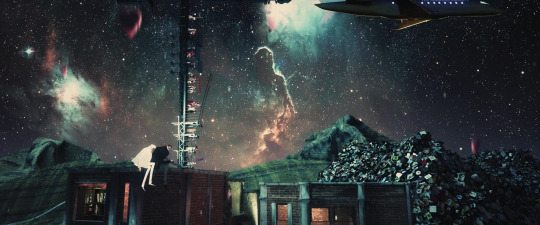
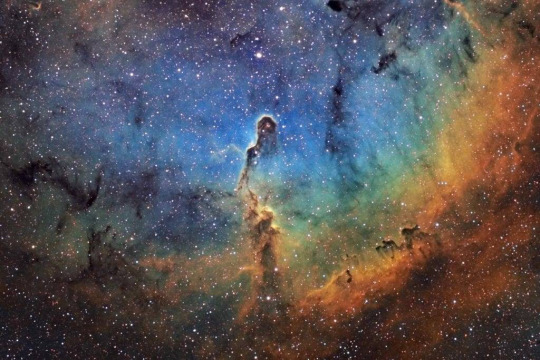
The nebula is a part of a constellation called Cepheus, after an Ethiopian king from the Greek mythology who agreed to sacrifice his only daughter in order to appease the gods and end a local calamity started by her mother and his wife, Cassiopeia (talk about generational responsibility). With time and a delightfully ironic twist of fate, the name of said daughter, Andromeda, became more famous than that of her father. Although she was chained up to a rock and offered to the sea serpent Cetus, the girl was spotted by the warrior Perseus, casually flying over the sea — either on the back of the Pegasus or thanks to a pair of winged sandals — after his victory over Medusa. He fell in love on the spot, defeated the serpent (with the help of a magical sword or Medusa’s severed head, depending on the varying sources), and freed the princess. That’s not exactly where their story ends, but we won’t be getting into the rest here.
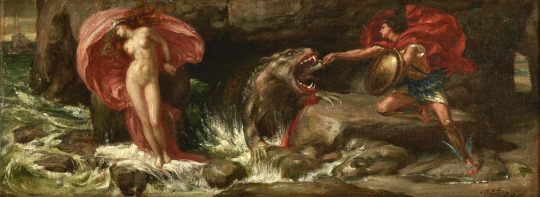
Not surprisingly, Neil has mentioned two parallel child sacrifice stories from the biblical context back in August. The first is one of the big ones — The Binding of Isaac. God's command to sacrifice Isaac, his only son, was a test of Abraham's faith. The angel of the Lord intervenes and provides a ram to be sacrificed in the boy’s place.
The second one isn’t nearly as popular, but you might have heard a variant of it in fairy tales or as the Law of Surprise invoked in The Witcher saga. In exchange for Israel’s victory over its enemies in battle, Jephthah had rashly promised God to repay the debt with the first thing seen on his return back home. The victorious warrior didn’t suspect to see his only child moving innocently "to meet him with timbrels and with dances" though. In horror, Jephthah covered his eyes with his cloak, but to no avail: ultimately, he was forced to honor his vow to God, and the girl was sacrificed. As grisly as it might look like in the Old Master’s paintings, it’s important to remember that human sacrifices weren’t limited to physical offerings only — Jephthah’s daughter might have been offered to God in the sense of officially shunning her family and dedicating her life to service instead, probably sequestered in a temple somewhere.
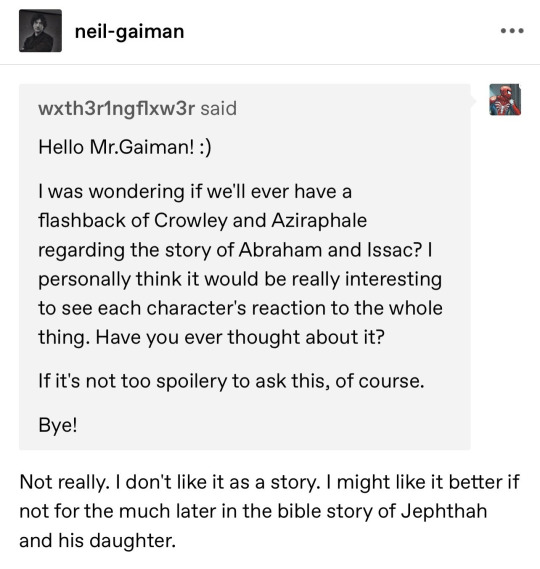
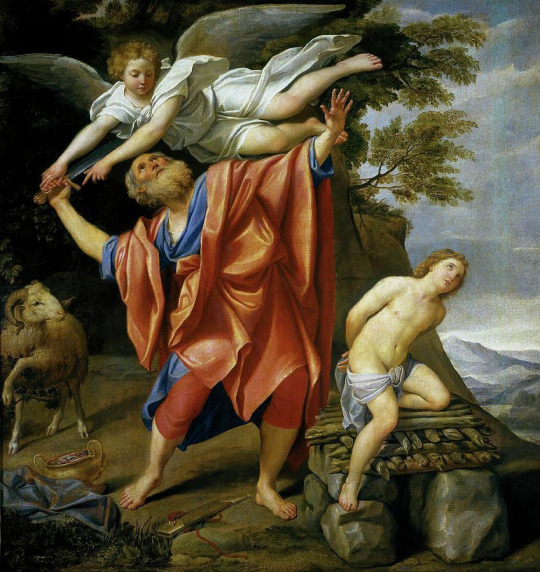
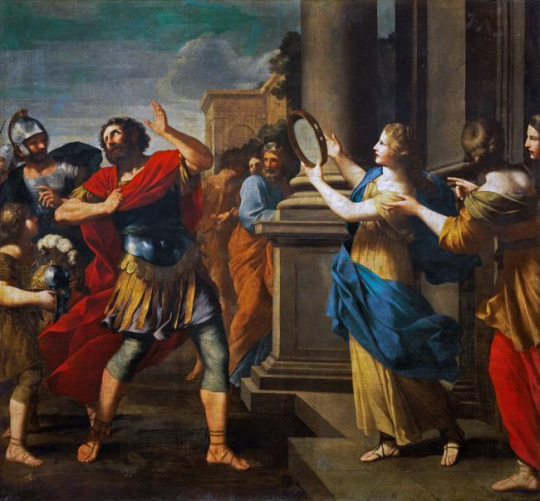
Interestingly, the main character of a big chunk of the Bible and the reason for the Second Coming happens to be THE most influential child sacrifice in the modern history. You know, a certain 33-year-old carpenter sent by his Heavenly Father to die on a cross for the sins of the mankind? Someone better call Aubrey Thyme ASAP.
Circling back to Aziraphale, he could be also seen as a representative of the concept of filial piety, since Eden willing to personally take a Fall not only for the humanity’s collective or individual transgressions, but the shortcomings of his Ineffable Parental Figure as well. Our favorite angel angel always fights for what is right and good, sure, but why would that be even a thing if God was truly omniscient, omnipresent, and omnipotent?
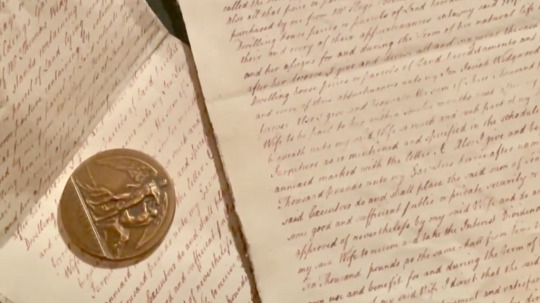

If Aziraphale’s medal is anything to go by, it looks like we might get an answer from the way it’s introducing another mythological narrative into the game, that is the story of Daedalus and Icarus. The most absorbing thing about this is the stark contrast to the recurring child sacrifice references for S3 mentioned in this post — Daedalus isn’t a father who wanted to sacrifice his son, it was his attempt to save him from imprisonment that ultimately drove Icarus to his death. The boy ignored his father’s explicit instructions, committing the grave and culturally universal sin of disobedience to one's parents that simply couldn’t go unpunished, one way or another.
But Icarus’s transgression could be seen both as high-flying ambition and striving for personal accomplishment as well as humanitarian sacrifice for knowledge and humanity’s advancement in general.
Similarly to a certain angel who left everything for what superficially seems like a work promotion, but is the ultimate act of love — both for his demon and the children they have been protecting and nurturing together for six thousand years. From the very Beginning, his white wings have been shielding everything he holds dear in this world.
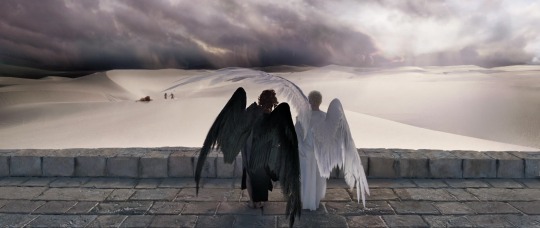
#happy easter#child sacrifice#greek mythology#bible fanfiction#good omens#good omens meta#never skip the intro#peter anderson studio#easter eggs#nebula#archangel michael approves#sword fighting with snakes#prince and the serpent#supreme archangel aziraphale#bamf aziraphale#aziraphale needs a hug#aziraphale#crowley#yuri is doing her thing#daedalus and icarus#cepheus and andromeda#abraham and isaac#jephthah’s daughter#god and jesus
140 notes
·
View notes